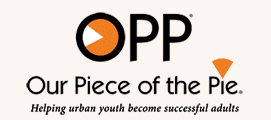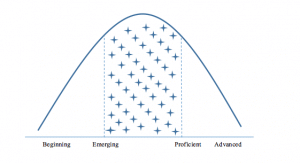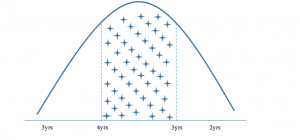Our Piece of the Pie and Competency-Based Education
CompetencyWorks Blog
Launched nearly 35 years ago, Our Piece of the Pie® (OPP®) is dedicated to helping Connecticut youth become economically independent adults. All of OPP’s strategies and services are structured to lead at-risk or disadvantaged youth, ages 14-24, toward the goals of achieving a college degree or vocational credentials and obtaining rewarding employment. This posting will focus on OPP’s journey in building its signature competency-based high school model.
OPP’s Competency-Based High Schools at a Glance
- Founded in 2009, Opportunity High School in Hartford is a unique partnership between Hartford Public Schools and OPP serving over 100 over-aged and under-credited students
- Founded in 2012, Learning Academy of Bloomfield is a co-operated high school between the Bloomfield Public Schools and OPP. During 2012-2013 the school served over 20 students with all seniors receiving diplomas
- In August 2013, OPP began its work with Norwalk Public Schools under an agreement with the state to turn around Briggs HS in Norwalk, a “failing” school serving up to 100 high-risk students
- With the June 5, 2013 vote of approval by the CT State Board of Education, OPP will open Path Academy, its first charter school, in Windham in August 2014 serving a maximum of 200 high school students who are off-track; in doing so, OPP becomes a charter management organization (CMO)
Eight Core Philosophies
The Path Academy model is the prototype for all of OPP’s Competency-Based High Schools. OPP builds the model around eight core philosophies that guide the innovative school model:
- Core Philosophy 1: Youth must be given the appropriate supports, both within and beyond academics, in order to succeed.
- Core Philosophy 2: Students must be active participants in their own learning.
- Core Philosophy 3: Technology is a critical 21st century skill, and must be incorporated into every aspect of the school model in order to adequately prepare students for post-secondary success.
- Core Philosophy 4: High quality teacher instruction is crucial for students at every stage of learning – particularly for students who are struggling or behind in skill attainment
- Core Philosophy 5: Students must never move back, only forward.
- Core Philosophy 6: Assessment is an ongoing part of good teaching & learning and data is vital in creating a positive and effective school environment.
- Core Philosophy 7: More time in school leaves less time to fall behind.
- Core Philosophy 8: Parent and community engagement is critical to student success, both within and beyond high school.
Three Types of Learning.
The academic Blended Learning model includes three distinct yet inter-related ways that students learn—computer-based instruction (CBI), teacher-led, and project-based learning. CBI is based predominantly on Edgenuity, which specifically tailors lesson plans to each student’s strengths and weaknesses, using diagnostic and concept mastery exams to determine individual learning pathways.
Teacher-led instruction uses reDesign’s Framework for Effective Education (FEI), a pedagogical approach which is intended to help students master foundational and higher order thinking skills applied at progressively more sophisticated content levels. In addition, the FEI provides a wrap-up assessment time at the end of each class period, giving teachers the necessary formative information about each student’s concept mastery.
Projects will follow a similar method, as students will be encouraged to personalize their work, choosing topics and themes that they find interesting or relevant. Teachers will also work with students to assign appropriate content to use when planning and implementing these projects. Projects will be evaluated based on student mastery of concepts during execution, and their ultimate mastery of the subject matter, as demonstrated in the final analysis, discussion, or presentation.
Why is OPP Using Competency-Based Education (CBE) to Drive its Model?
Quite simply, OPP believes that competency-based education (often referred to as mastery or proficiency-based) is the first, second, and third option for over aged and under-credited students. Far behind, off track, and with their biological clock ticking, students are in a race against time to meet career and college success standards before they “age out” of the system.
Competency-based progression allows students to accelerate credit attainment in areas that they can master quickly, while spending more time on concepts that they find to be more difficult. For over aged and under-credited youth, this makes particular sense, as many have already attended some portion of the classes for a given course. When they are forced to sit through the entire year of the course again, they quickly disengage. Mastery-based systems also ensure that students have actually mastered concepts that they will need in order to be prepared for success in the next level of coursework, contributing to student persistence in academics.
Competency-based progression enables teachers to monitor each student’s concept mastery to inform the next learning path. However, the challenge is operationalizing this on behalf of its students.
Operationalizing CBE
- Flexible scheduling options will cater to mastery-based progression, leaving room for students to move forward and pass classes at any point during the year
- Time for extra support time, to help students catch up and/or remain on target; this will be achieved partially through an extended day/year schedule, which gives students additional learning time
- Students will progress through six Learning Cycles per year, which each consist of approximately six “standard” weeks and one “path building” week during which students will be exclusively refocused on any weaker areas where they have not yet mastered skills and concepts.
- Further flexibility for students with additional academic needs or extracurricular obligations through at least one Intervention/ Acceleration period every day with every Wednesday built specifically around this strategy, with teachers pulling groups of similarly-performing students together for individualized support.
- Formal “data days” at the end of each Learning Cycle during which teachers meet without students to make instructional and scheduling decisions for the next cycle
Path Academy Graduation Pacing
Path Academy’s pacing structure will use time as the variable, rather than achievement.
In order to graduate in three years (completing all courses offered), students must finish three classes per trimester, or six classes every two trimesters. Students will be assigned to a graduation pacing plan when they come in, modeled off of this three year, accelerated plan. The plans will be adjusted as they move through courses
Expectations, requirements, and levels of achievement will not change for students – rather, the amount of time that they spend on each activity, class, etc. will change.
“STANDARD” BELL CURVE:
PATH ACADEMY BELL CURVE:
Path Academy Course Pacing
A standard, one credit course will be completed over the course of two trimesters (four learning cycles) for a student at the 3-year graduation pace. For a creator/teacher, courses break down as follows:
- Course
- Units
- Grouped and prioritized standards (standards drive instruction)
- Learning activities (mapped to standards)
- Assessments (test students’ grasp of academic and non-academic priority standards, including through analyzing student products and projects )
Policy Issues and Challenges in CT Related to Competency-Based Education
The OPP model depends on the flexibility to award credit to students based on what they can show rather than time. OPP’s experience suggests that it is difficult to operate a successful high school for over-aged and under-credited youth without implementing a complete CBE model. Attempts by OPP to institute hybrid approaches in which schools combine elements of CBE with many traditional aspects of time-based education have been mixed. Our experience suggests that this is for two reasons:
- Traditional time-based education is more familiar to students, staff, and parents and therefore attempts to mix it with CBE typically default back over time to traditional.
- CBE’s success is largely based on motivating students to take ownership of their own education and a hybrid approach severely compromises this cutting edge strategy.
For these reasons OPP has been advocating for CBE in CT for over a decade. Two important victories were obtained with the June 5th approval and the July 15 approval by the CT State Board of Education of the Path Academy model. It enables OPP to fully implement CBE in its new charter in Windham and at the Briggs School in Norwalk where OPP is a partner with Norwalk Public Schools in a Turnaround plan. But this applies to just these two schools.
Effective July 1, 2013, the state legislature passed PA 13-108 which allows students to earn credit toward high school graduation outside a classroom through a demonstration of mastery based on performance. This legislation clears the path for OPP to fully implement CBE in non-charters around CT including at OHS and Briggs HS.
This is potentially a landmark decision for OPP and other educators in CT interested in fully implementing CBE. It is a particular victory for over 20,000 over-aged and under-credits students in CT and we applaud the legislature for this bold move. We also hope that this legislation can become a model for other states so that more students can benefit.
photo credit: www.opp.org
Ephraim Weisstein is founder of Schools for the Future. Previously, Ephraim Weisstein was a co-designer of Diploma Plus, a nationally acclaimed alternative high school model operating 30 schools in eight states and serving 4,000 formerly disconnected youth. You can reach Ephraim at [email protected]


